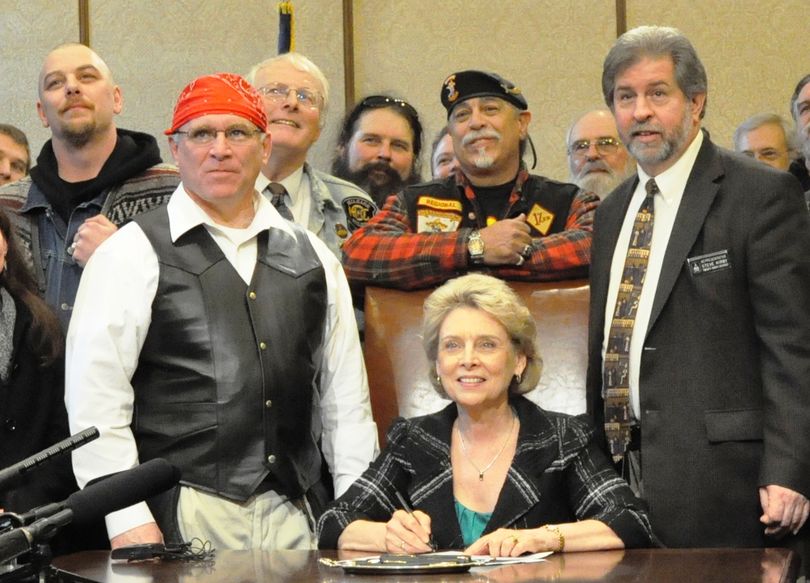What would the Wild One say?

A biker wearing a Bandidos patch and a 1 percenter patch poses for a picture behind Gov. Chris Gregoire at last week's signing of the motorcycle profiling law.
My image of the outlaw biker, that iconic badboy of the latter half of the last century, lost a bit of its tarnish last week in an unusual setting. The governor’s office.
Some folks who at least harbor desires to be outlaw bikers joined other motorcyclists and state legislators while Gov. Chris Gregoire signed a bill forbidding cops from “profiling” them when they get their motors running and head out on the highway. Under the law, being on a motorcycle is not a reason for being pulled over…not that police would ever do that, mind you.
The governor’s conference room hosts all manner of characters when bills that work their way through the Legislature get signed, so there’s no way to say this was the motliest crew ever to gather round the conference table and smile for the cameras after Gregoire signed on the solid line.
But they may have been the most ostentatious in their display of professed disregard for law – an odd bit of irony, considering they were attending the christening of a new law. Along with club colors for the Bandidos, which was once a target of major law enforcement actions in Washington, several of the signature observers sported the diamond shaped, red and yellow 1%-er patch...
To read the rest of this post, or to comment, click here to go inside the blog.
They stood a few persons to the left and right of Gregoire during the signing ceremony, and one peered over the top of the high-backed chair in which she sat, smiling at the appropriate time when photos were snapped.
For those unfamiliar with biker nomenclature, the patch refers to a comment supposedly made in the ‘40s or ‘50s (sources vary) that 99 percent of motorcycle riders are decent, law-abiding citizens, and 1 percent are law-breakers giving the rest a bad name. Outlaw bikers adopted the 1%-er label decades ago as a badge of pride, and to presumably clear up any uncertainty folks might have about which group the belonged.
Rep. Chris Hurst, D-Enumclaw, a supporter of the anti-profiling bill and chairman of the committee which held its House hearings, noticed the colors and patches in a photo published in The Spokesman-Review. He recognized them in part because he spent 25 years in law enforcement, all but two of them in investigations and 14 of them in narcotics.
Bill-signings are open to the public, just like legislative hearings and debates, Hurst said, so there was nothing untoward about outlaw bikers being there. (Maybe so, but somewhere in Hollywood Heaven, the Wild One's Johnny Strabler is spinning in his grave.)
If they engage in illegal activity advertised by the 1%-er patch, the anti-profiling bill doesn’t help them, Hurst added.“If a person is committed to a life of organized crime, they should expect no protection under this law.”
Outlaw biker gangs aren’t the scourge they once were, Hurst added. Starting in the ‘60s, outlaw biker groups like Hells Angels, Gypsy Jokers, Ghost Riders grew powerful by trafficking in methamphetamine and weapons. They fought law enforcement, and each other for territory.
Then the Mexican drug cartels moved into the meth trade with a purer, cheaper form of speed, and an even more aggressive business model that involved eliminating all competition with heavier fire power. Most of the outlaw biker leaders from the old days are either in prison, or dead from turf wars or road accidents. “It’s a tough lifestyle,” Hurst said.
So it’s not even clear that these 1%-er Bandidos are associated with the old days and old ways of the outlaw gangs. Maybe they just chose a denim or leather jacket with those colors in their wardrobe closet because it matched the rest of their outfit.
In any case, if they want to join the rest of the motorcycle groups lobbying for more changes – the umbrella organization, ABATE, would also like to change the mandatory helmet law – they should be warned.
Olympia can be rough turf, too. You thought the Mexican drug lords were bad? Wait ‘til you cross a business lobbyist in a $2,000 suit, with a smartphone and briefcase.
